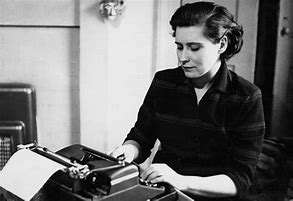SOMERVILLE, Mass. Maggie Turbek had a moderately successful career in the historically unremunerative field of literature, with freelance magazine assignments that paid in the low four-figures, a ten-year run as an editor in New York and a first novel that sold nearly twenty thousand copies. “That’s not really a lot,” she says ruefully. “There was no second novel.”

“If I catch you whining about writer’s block, I’m going to come to your condo and snap all your no. 2 lead pencils in half!”
And so Turbek has turned to helping other writers realize their potential with her inside knowledge of the publishing industry and her own creative impulse. “The main thing I drum into my clients,” says the self-described writing “coach,” “is to stop writing about writing.”
This morning she’s at a bank of computers along with a recently-hired assistant, Lorna Twellman, a graduate of Tufts University who has been unable to find full-time employment with her degree in English. The two bellelettrists scan social networking sites, on-line writer’s forums and other places where would-be writers congregate . . . to complain about the difficulties of their chosen profession.
“Can’t write . . . bang head on laptop.”
“I think you might want to take a look at this,” Twellman says to Turbek, and the older woman leaves her desk to peer over the younger’s shoulder. “Oh my God–good catch!” Turbek says as reads a Facebook “status” update by Michelle Bromley, an M.F.A. in writing candidate at Skidmore. “Can’t write today,” Bromley says. “So I’m riffing on repressive ‘simultaneous submission’ policies at literary quarterlies that put my life on hold while I wait for rejections!”
“Leave this one to me,” Turbek says, and the younger woman scoots her chair aside. “Let me quote you a line from The Godfather, girlie,” Turbek taps out on Bromley’s Facebook page, and Twellman recoils at the ferocity with which the seasoned pro cracks away at her keyboard. “Nunzio–why do you complain? This is the life you have chosen. Capiche?”
“You’re not giving your work the proper respect.”
Soon the fruitless activity of the young writer ceases, a sign that she has turned back to her work; a coming-of-age novel that her advisor estimates won’t be finished by the time’s she’s eligible to collect Social Security. “For once somebody listens to me,” Turbek says as she pops a piece of licorice in her mouth.
She returns to her work station and checks out the blog of Todd Raymond, a client who sought her out when he was “blocked” writing a screenplay about the dissolute life of a young man much like himself living in New York City. “WAY too much to drink last night,” Raymond has written. “Woke up at noon, showered, off to brunch and maybe a hair-of-the-dog mimosa with friends!”
“On the other hand, ass hanging around in bar equals . . . nothing.”
Turbek scrolls down to the bottom of the “post” and adds a comment that is pithy, to-the-point, and merciless. “Let me quote you a line from one of your heroes, Oliver Stone,” she writes: ‘Ass + Seat = Writing.’ You could waste another day, or you could maybe–for once–be tough on yourself AND ACTUALLY WRITE SOMETHING!”
There is a lag of about a minute before a reply appears: “Okay Maggie–you got me. I’ll stay in today.”
That’s not good enough for Turbek, who fires right back “And no pro football jibber-jabber on ESPN.com, either, mister.”
The blog goes silent after that final smack-down, so Turbek starts to check out some other clients in her stable, typing in their last names with an ampersand in the middle to see if she can catch them commiserating in writer’s chatrooms. “What a couple of pansies,” she says with disgust, loudly enough for her assistant to hear.
“What?” Twellman asks, hoping to pick up some pointers she can use to hang out a shingle as a writing coach herself someday.
“They’re trading ‘prompts,’” Turbek says with ill-disguised contempt. She quickly logs on to the site–icantwrite.com–chooses a user name and a password and breaks into the discussion with a ice-cold blast of realism. “Thinking of something to write about is half the battle!” she snaps at the two tyros. “Do you think Sylvia Plath and Ted Hughes traded ‘prompts’? Hawthorne and Melville? Lie down and think about something that made you cry, or made you scared if you have to. DON’T ASK SOMEBODY TO BE CREATIVE FOR YOU!”
“O-kay,” says Cynthia Ward-Nathan, a freelancer who had just suggested “Why I’m Dreading My 10th High School Reunion!” as the prompt of the day. “Well, uh, my writing coach is making me cry and making me scared–I guess I’ll write about that.”

